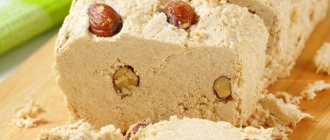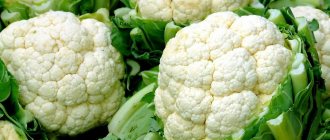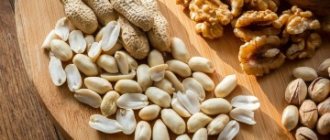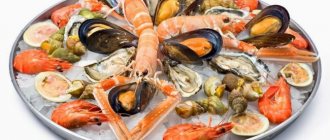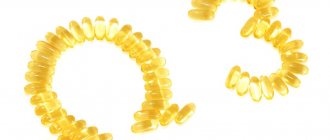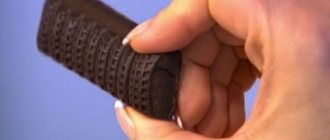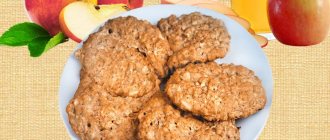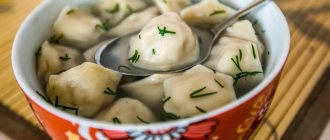Sugar during breastfeeding: benefits and harms
Can a nursing mother have sugar? Of course, we are not talking about completely excluding this product from the menu. After all, sugar has a number of beneficial properties:
- This is a carbohydrate, and therefore is necessary to “recharge” the body with energy.
- The sweet product promotes better absorption of certain vitamins.
- Sweet foods promote the release of endorphins (happiness hormones). This point is especially relevant for mothers suffering from postpartum depression. Sometimes during breastfeeding you simply crave sweets unbearably.
However, despite the advantages, sugar has many more negative properties that cannot be ignored during lactation:
- Refined sugar in crystal form is considered empty. During processing, all vitamins and minerals are lost. It's just pure carbohydrate. Ideally, you need to replace it with fruits, vegetables and cereals - these are both carbohydrates and nutrients.
- Sugar crystals are absorbed instantly, sharply raising blood glucose levels. And after some time there follows a sharp decline. This may not have the best effect on the functioning of the endocrine and immune systems. And even provoke diabetes.
- Sweets in excess, especially in combination with other foods, cause fermentation in the body. This can lead not only to intestinal problems for the mother, but also cause painful colic in the baby.
- Eating a lot of sweets by the mother can lead to allergies or diathesis in the child. The baby's body is trying to cope with the increased amount of glucose in milk and is trying with all its might to remove toxins. At the same time, all internal organs experience significant stress.
- And of course, no one has canceled the problem of excess weight. The fact that eating sweets makes you gain weight is no longer a secret. And for a young mother trying to return to her pre-pregnancy figure, extra pounds are of no use at all.
Is it possible to drink tea with sugar during lactation? If you really want to, then you can. With one caveat: the number of spoons of sugar should not exceed one or two.
Some mothers prefer to eat cane sugar. In terms of calorie content, it is not much different from ordinary beetroot and at the same time contains a certain amount of useful substances (for example, vitamins). However, the cane version is just as harmful as the regular one. In particular, it is prohibited for people with diabetes.
Is regular sugar really that bad?
Probably, few people know that for diseases of the spleen and liver, patients are often prescribed a so-called “sweet diet”. Sugar prevents arthritis, improves blood circulation, eating it prevents the formation of plaques in blood vessels and thus prevents thrombosis. However, the benefits of this product only appear when consumed in moderation. Otherwise, you risk developing obesity, pancreatic diseases and even diabetes.
What's in sugar? First of all, when we consume sugar, we gain calories. The main component of sugar, sucrose, includes fructose, glucose and lactose. The latter is also nicknamed “milk sugar”. Breast milk lactose is necessary for a child to function normally in the intestines, maintain the balance of its microflora and, therefore, prevent dysbiosis, and also promotes the absorption of calcium and B vitamins. The lactose derivative galactose plays an important role in the formation of the brain.
So can a mother consume sugar while breastfeeding?
You will not find vitamins, microelements, fiber, which are so necessary for our body. 100 grams of sugar will give us 400 thousand calories.
Therefore, overweight and overweight people are recommended to replace the artificially obtained product with sweets of plant origin - from the garden or vegetable garden.
And also sugar:
- increases acidity in the mouth;
- provokes calcium deficiency;
- despite preventing the formation of plaques (see above), it negatively affects the quality of the vessels themselves, as well as bones.
Read also:
Can a nursing mother eat bananas?
Through mother's milk, sugar enters the baby's body and has the same effect on him as it does on us. Therefore, when breastfeeding, a mother should carefully monitor his behavior and condition. Sugar can intensify or cause colic, cause diathesis or skin rashes. If you don’t overdo it and don’t get carried away with sugar in one form or another, then most likely everything will be fine, and you and your child will not feel the slightest discomfort.
Still, if you are afraid to eat regular sugar, then you can think about replacing it with something.
Permitted rate
So, you can eat sugar while breastfeeding. How to calculate the permissible norm for breastfeeding? Determining the exact amount in teaspoons is quite difficult. The norm is individual. A nursing mother should consume sugar taking into account the peculiarities of the reaction of the baby’s and mother’s body.
Consumption of sweets should be reduced to a minimum (or completely abandoned) if:
- the child has severe allergies and/or colic;
- a nursing mother has a tendency to increase blood glucose (for example, there were bad tests during pregnancy);
- mother has close relatives with insulin-dependent diabetes;
- Mom wants to lose weight.
It is most convenient to keep a food diary, which will reflect the number of sweets eaten. This way the mother will control her diet, while simultaneously observing the baby’s reaction. Keep in mind that you need to take into account not only the pure product, but also white bread, candy, cookies and other products where sugar is added.
According to medical standards, a woman can consume no more than 30 grams of sugar per day in total. This is approximately 6 teaspoons. For breastfeeding, you can adhere to these standards or adjust the amount downward.
The mother's nutrition for the first month after the birth of the baby should be as correct as possible. It is worth giving up all allergenic foods, including sweets.
How much sugar can a nursing mother eat?
The answer to this question cannot be unambiguous. Everything is individual. If the baby is not prone to diathesis and food allergies, then the amount of sweets in the mother’s diet may be greater. In case of rashes and allergic reactions, you will have to strictly limit the amount of sweets on the menu.
It is best to keep a food diary, recording the type and quantity of sweets, as well as noting the child’s well-being. This way you can experimentally determine the amount of sugar that will not harm the baby.
If mommy is afraid of experiments and doesn’t want to bother herself with keeping a diary, then you can simply act based on common sense.
For example, a couple of teaspoons placed in tea, or one piece of candy for breakfast will only bring benefits and will definitely not harm the baby
How to replace it
A nursing mother is unlikely to be able to completely eliminate sugar from her diet. But replacing sugar with other sweet-tasting foods is quite possible.
Fructose
It has been proven that fructose is less harmful during breastfeeding, since it is a natural product extracted from fruits or honey. Its value is as follows:
- strengthening the immune system;
- fructose in small quantities can be consumed even by mothers with diabetes;
- fructose can be used as an ingredient for preparing various dishes (as an alternative to granulated sugar).
Harm of chemical sweeteners
When breastfeeding, you should never use chemical-based sweeteners. These substances can seriously affect the health of even an adult, not to mention an infant.
For example, xylitol and sorbitol cause intestinal upset, aspartame is converted into a toxin and contributes to the development of oncology, cyclamate is banned in Europe because it is harmful to the kidneys, saccharin accumulates in the body and is harmful to the gastrointestinal tract, it is also banned in the West.
If you use sweeteners, then only natural ones - fructose or stevia. But they also need to be dosed strictly and not exceed the daily limits recommended by the doctor.
When breastfeeding, you don’t need to go to extremes and completely eliminate sweets from your diet. A small amount of sugar is needed by the body. But it is advisable to get it from natural products and homemade sweets prepared yourself. And, of course, we must not forget about a sense of proportion.
Artificial sugar substitutes: a definite no
During lactation, the use of chemical sweeteners is unacceptable.
The most common artificial sweeteners are Cyclomate, Aspartame, and Sorbitol. It is strictly unacceptable to use them during breastfeeding. The components of any such sugar substitute easily penetrate the baby’s body through milk and negatively affect the gastrointestinal tract of the mother and baby. Moms should pay attention to more gentle natural options. The optimal sugar substitute for feeding is glucose or a stevia-based alternative.
The sweetener Cyclomat is prohibited for distribution in the European Union. Aspartame is no less dangerous to health. This sweetener is processed into methyl alcohol and, accordingly, is poisonous for adults and children. Some scientists believe that these sweeteners can even cause cancer.
So, for mothers who love to treat themselves to delicious things, there is good news - you don’t have to give up all sweets. It is only important to dose the amount of sugar entering the body. In addition, there are many natural substitutes that will saturate the body and satisfy the sweet needs of a young mother.
Beneficial features
If you eat a product that contains a lot of carbohydrates, you can increase the level of the hormone serotonin. Thanks to this substance:
- the general tone of the body is normalized;
- the state of fatigue goes away;
- insomnia is eliminated;
- pain is relieved.
If a nursing woman does not have enough serotonin in her body, her mood may deteriorate. This makes you want to eat something tasty and sweet. Using regular sugar, you can also activate the production of the hormone endorphin, which is also called the “hormone of joy.” This is why you often want to treat yourself to something tasty.
It's hard to imagine that sugar can be harmful to humans. Especially considering that both adults and children love sweets. How can you harm your body with sugar, which helps lift your mood and gives you strength and energy? However, it is worth considering whether it benefits the body during breastfeeding?
One nursing mother thinks that there is nothing wrong with the baby receiving carbohydrates through milk, which will give him more energy. And other women are sure that this sweet product should not be consumed while breastfeeding, as it can cause allergies and colic in the infant.
Whether you can eat sugar or not, everyone decides for themselves. After all, everyone’s body is individual. Someone can indulge themselves with sweets and not have any troubles, while others limit themselves even to sweet tea so as not to cause problems with the well-being of the newborn.
How to properly consume sugar while breastfeeding
Sugar consists of fructose, lactose and glucose. These substances are very important for a woman during breastfeeding. But due to the fact that sugar goes through many stages of processing during production, most of these beneficial substances are lost. Based on this, its use cannot be called exclusively useful.
However, you shouldn't give up sugar completely. The large number of positive properties it possesses are necessary for a woman and her child.
The most balanced option would be moderate consumption of both sugar and its substitutes in the diet of a nursing mother.
It is better to exclude any sweets in the first month of a child’s life. But, starting from the second month, you can gradually include sugar and its analogues in your diet. If they do not cause any allergic reactions, then you can consume them daily, but in no case overeating.
During breastfeeding, the mother, in any case, should limit her sugar intake, and also consider options for replacing it with safer analogues.

